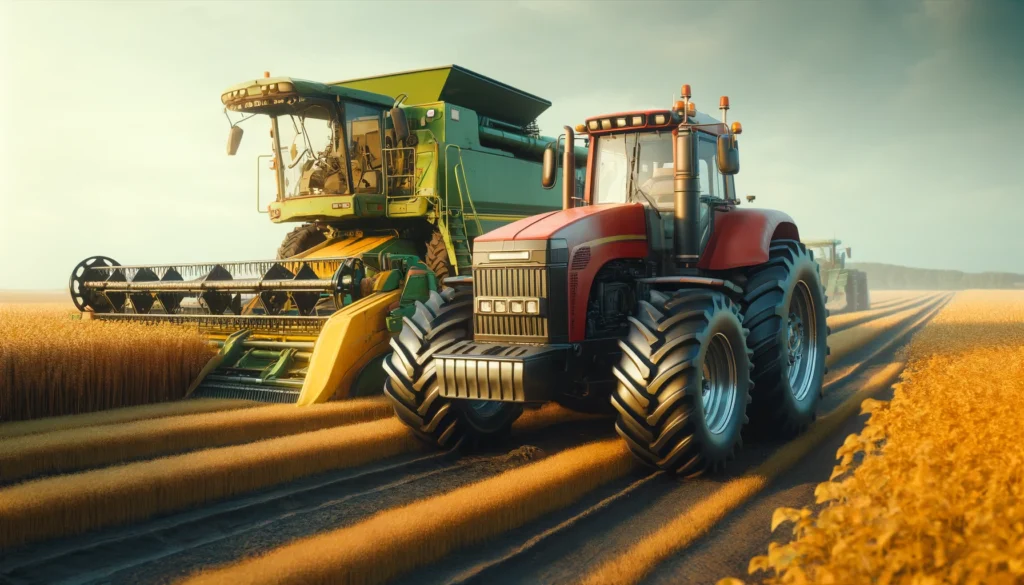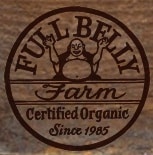
Farm equipment A medium shot of various farm equipment. The scene includes a large tractor a combine harvester and a plow. The tractor is bright red with large tir.webp.webp
Definition: Farm Equipment
Farm equipment refers to the machinery and tools used in agricultural operations to enhance productivity and efficiency. This includes a wide range of devices, from simple hand tools to complex machinery like tractors, plows, harvesters, and irrigation systems. Farm equipment is essential for various farming activities such as planting, cultivating, harvesting, processing, and transporting agricultural products. The proper selection, maintenance, and use of farm equipment can significantly impact the success and sustainability of a farm.
Modern farm equipment incorporates advanced technology to improve precision, reduce labor, and optimize resource use. Innovations such as GPS-guided tractors, automated irrigation systems, and drones for crop monitoring are revolutionizing the way farms operate, leading to higher yields and more sustainable practices.
Fall off the barn roof and busted your keister? Life on the farm or ranch can be tough on the bum. Need a break? Laugh it off at FarmerCowboy.com, the #1 farm humor site. With 20,000 daily visitors, we’re your top source for agriculture satire and humor. Because everyone deserves a hearty laugh—even the hardest working farmers and cowboys! Join us and turn those long days into fun tales at FarmerCowboy.com.
Farm Equipment: An In-Depth Guide
Introduction
Farm equipment plays a critical role in the efficiency and productivity of agricultural operations. From traditional tools to cutting-edge machinery, the right equipment can transform farming practices, making them more effective and sustainable. This guide explores the different types of farm equipment, their uses, and best practices for maintenance and management.
Types of Farm Equipment
Farm equipment can be categorized based on its function and use in various farming activities:
1. Tractors
Tractors are versatile machines used for a wide range of tasks, including plowing, tilling, planting, and hauling. They come in various sizes and configurations to suit different farm needs.
2. Plows
Plows are used to break up and turn over soil, preparing it for planting. They help to incorporate organic matter into the soil and control weeds.
3. Seeders and Planters
Seeders and planters are machines designed to sow seeds in precise rows and depths, ensuring optimal plant spacing and germination rates.
4. Harvesters
Harvesters are used to gather mature crops from the fields. Types of harvesters include combines (for grains), forage harvesters (for silage), and specialty harvesters (for crops like potatoes and cotton).
5. Irrigation Systems
Irrigation systems provide water to crops, ensuring they receive adequate moisture for growth. Types of irrigation systems include drip irrigation, sprinklers, and pivot systems.
6. Sprayers
Sprayers are used to apply pesticides, herbicides, and fertilizers to crops. They help to control pests, weeds, and diseases, promoting healthy plant growth.
7. Balers
Balers compact and bind hay, straw, or other crops into bales for easy handling, transport, and storage.
8. Tillers and Cultivators
Tillers and cultivators are used to prepare the soil for planting by breaking up compacted soil and controlling weeds.
9. Farm Tools
Basic farm tools include shovels, hoes, rakes, and pruners, which are essential for various manual tasks around the farm.
Importance of Farm Equipment
Investing in quality farm equipment is crucial for several reasons:
- Increased Productivity: Modern machinery and tools enhance the efficiency of farming operations, leading to higher yields and reduced labor costs.
- Precision Agriculture: Advanced equipment enables precision farming practices, improving accuracy in planting, fertilizing, and harvesting.
- Resource Management: Efficient equipment use helps optimize the use of water, energy, and other resources, promoting sustainable farming.
- Safety and Efficiency: Properly maintained equipment reduces the risk of accidents and injuries, ensuring safer working conditions for farm workers.
- Cost Savings: Investing in durable, high-quality equipment can reduce long-term maintenance costs and improve overall profitability.
Challenges in Managing Farm Equipment
Despite its benefits, managing farm equipment can present several challenges:
- High Initial Costs: The purchase of modern machinery requires significant capital investment, which can be a barrier for small and medium-sized farms.
- Maintenance Requirements: Regular maintenance is essential to keep equipment in good working condition, requiring time, effort, and financial resources.
- Technological Complexity: Advanced equipment often comes with complex technology that requires specialized knowledge and training to operate effectively.
- Depreciation: Farm equipment depreciates over time, impacting its resale value and the farm’s financial planning.
- Environmental Impact: The use of heavy machinery can contribute to soil compaction and other environmental issues if not managed properly.
Best Practices for Farm Equipment Management
To maximize the benefits of farm equipment, consider the following best practices:
1. Regular Maintenance
Implement a routine maintenance schedule to keep equipment in optimal condition. This includes regular inspections, cleaning, lubrication, and timely repairs.
2. Operator Training
Ensure that all operators are properly trained in the use of equipment and understand safety protocols. Training improves efficiency and reduces the risk of accidents.
3. Precision Farming
Utilize precision farming technology to enhance the accuracy and efficiency of equipment use. GPS-guided tractors and automated systems can improve planting, spraying, and harvesting operations.
4. Equipment Rotation
Rotate the use of equipment to evenly distribute wear and tear. This practice extends the lifespan of machinery and reduces the risk of breakdowns.
5. Environmental Considerations
Adopt environmentally friendly practices when using equipment. This includes minimizing soil compaction, reducing fuel consumption, and implementing sustainable land management techniques.
Case Study: Successful Farm Equipment Management
The Greenfield Family Farm
The Greenfield family operates a 1,000-acre mixed crop and livestock farm. They have successfully integrated modern farm equipment into their operations, leading to significant improvements in productivity and sustainability. Key elements of their success include:
- Advanced Tractors and Harvesters: The Greenfields invested in GPS-guided tractors and high-efficiency harvesters, which enhanced precision and reduced labor costs.
- Efficient Irrigation Systems: They installed drip irrigation systems that optimized water use and improved crop yields.
- Regular Maintenance and Training: The family implemented a comprehensive maintenance schedule and provided training for all equipment operators, ensuring safe and efficient use.
- Environmental Stewardship: The Greenfields adopted conservation tillage practices and used low-emission machinery to reduce their environmental footprint.
Results
The Greenfield family’s strategic use of farm equipment led to increased crop yields, improved resource efficiency, and enhanced sustainability. Their investment in advanced machinery and best practices for equipment management supported the long-term success and profitability of their farm.
Conclusion
Farm equipment is essential for the efficiency and productivity of agricultural operations. By investing in quality machinery, implementing regular maintenance, and utilizing precision farming technology, farmers can enhance their operations and support sustainable farming practices. Understanding the different types of equipment and best practices for their use and management is crucial for maximizing the benefits and ensuring the long-term success of a farm.
How Knowledge of Farm Equipment Can Help Farmers
Understanding farm equipment helps farmers make informed decisions about machinery investments, maintenance, and upgrades. Knowledge of different types of equipment and their uses enables farmers to optimize resource use, enhance productivity, and ensure the safety and welfare of their workers and livestock. This understanding also supports sustainable farming practices and long-term agricultural success.
Resources for Further Reading
To further explore farm equipment and related agricultural topics, visit the following resources:

Originally posted 2022-05-24 08:11:20.
Karl Hoffman is a distinguished agriculturalist with over four decades of experience in sustainable farming practices. He holds a Ph.D. in Agronomy from Cornell University and has made significant contributions as a professor at Iowa State University. Hoffman’s groundbreaking research on integrated pest management and soil health has revolutionized modern agriculture. As a respected farm journalist, his column “Field Notes with Karl Hoffman” and his blog “The Modern Farmer” provide insightful, practical advice to a global audience. Hoffman’s work with the USDA and the United Nations FAO has enhanced food security worldwide. His awards include the USDA’s Distinguished Service Award and the World Food Prize, reflecting his profound impact on agriculture and sustainability.





Farm Radio satire: Sheep start using smartphones, wool productivity drops.